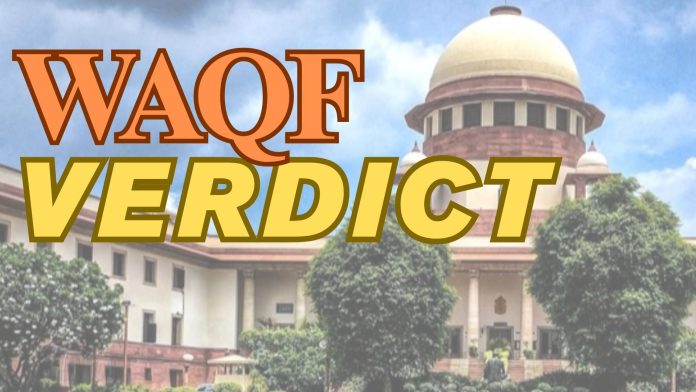New Delhi: The Supreme Court of India will pronounce its verdict on Monday, September 15, 2025, regarding pleas challenging the Waqf (Amendment) Act, 2025. Over 100 petitioners have argued that the new law amounts to a “creeping acquisition” of Muslim properties, while the Union Government has defended it as a measure to prevent widespread encroachment of public and private land, reported the Hindu.
A Bench headed by Chief Justice of India B.R. Gavai heard the matter for three consecutive days in May before reserving the judgment on May 22. The case had reached the court in early April, just hours after Parliament passed the Bill.
Congress MP Mohammed Jawed, one of the first petitioners and a member of the Joint Parliamentary Committee (JPC) on the Bill, contended that the law imposes arbitrary restrictions on waqf properties, undermining the religious autonomy of Muslims and violating property rights guaranteed under Article 300A of the Constitution.
On April 17, the then CJI Sanjiv Khanna-led Bench had secured an assurance from the Centre that it would not alter the character or status of waqf properties until the court decided on the matter. Following Justice Khanna’s retirement in May, the case was later heard by Chief Justice Gavai and Justice A.G. Masih.
States, political leaders, and organisations have also intervened in the matter. Tamil Nadu’s ruling DMK questioned the impartiality of the JPC, while the Kerala government opposed the law, stating it threatened the rights of a large Muslim population in the state to manage their religious affairs.
Senior advocate Kapil Sibal, representing the petitioners, argued that the amendments violated the freedom of religion under Article 25 and would cause “irreparable injury” if implemented. He highlighted provisions such as Section 3C, which allows disputes over waqf authenticity, and Section 3D, which nullifies waqfs if the land is declared a protected monument. Petitioners also raised concerns about allowing non-Muslims in waqf boards and the invalidation of unregistered waqfs that historically lacked documentation.
Defending the amendments, Solicitor General Tushar Mehta maintained that creating waqfs was not an essential religious practice in Islam. He argued that Articles 25 and 26 permit state regulation of secular aspects of religious institutions, including financial management, to ensure accountability. He further asserted that waqfs-by-user were given recognition by statute and could be withdrawn by legislation if societal conditions demanded.
The judgment on whether the Act will be stayed or allowed to operate is expected to have far-reaching implications for the administration of Muslim charitable and religious endowments across the country.




